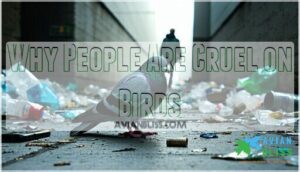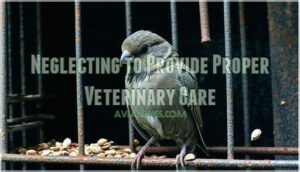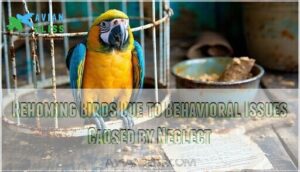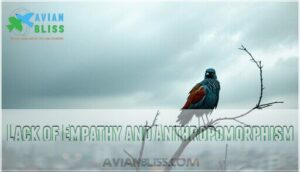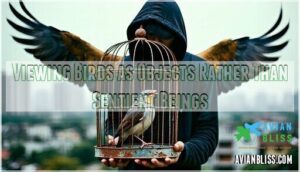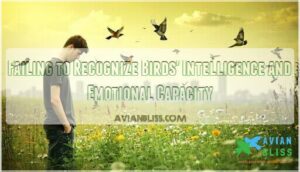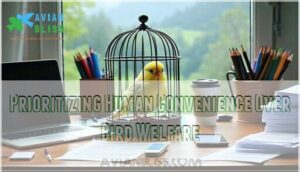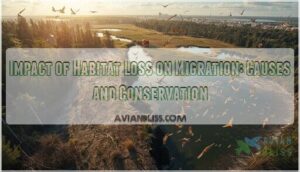This site is supported by our readers. We may earn a commission, at no cost to you, if you purchase through links.

Many don’t realize birds are incredibly intelligent creatures with complex emotional needs, instead viewing them as colorful decorations that chirp on command.
When reality hits—birds bite, scream, and require decades of commitment—some people resort to neglect or abandonment rather than addressing their own lack of preparation.
Society’s portrayal of birds as "easy pets" creates unrealistic expectations, while weak legal protections make abuse easier to hide.
Understanding these psychological and social factors reveals why some people treat these remarkable creatures so poorly, and what signs to watch for, highlighting the need for better awareness of birds’ complex emotional and social needs, including their intelligence and capacity for complex emotional needs.
Table Of Contents
- Key Takeaways
- Cruelty Towards Birds
- Why People Are Cruel on Birds
- Irresponsible Bird Ownership
- Causes of Bird Cruelty
- Preventing Bird Abuse
- Frequently Asked Questions (FAQs)
- Why do birds hate certain people?
- Why are some people terrified of birds?
- Is having a bird as a pet cruel?
- Why are some people so cruel to animals?
- Is bird abuse a thing?
- Is keeping a bird in a cage cruel?
- Is it inhumane to have a bird?
- Are caged birds cruel?
- Is caging birds a form of animal cruelty?
- Are parrots abused?
- Conclusion
Key Takeaways
- You’re likely contributing to bird suffering if you buy them impulsively without understanding their complex needs – they require decades of commitment, specialized diets, and hours of daily social interaction that most people can’t provide.
- You’ll find that society’s biggest problem is treating birds like decorative objects rather than intelligent beings with emotions – this mindset makes neglect and abandonment seem acceptable when birds don’t behave as expected.
- You can spot the warning signs of irresponsible ownership through inadequate housing, lack of veterinary care, prolonged isolation without enrichment, and frequent rehoming due to behavioral issues caused by neglect.
- You need to recognize that weak legal protections and poor enforcement allow bird abuse to continue – only 12% of households even consider bird mistreatment as legitimate animal cruelty, creating a cycle where these intelligent creatures remain vulnerable.
Cruelty Towards Birds
You might think birds are just simple creatures, but they’re actually incredibly intelligent and emotional beings who suffer deeply when mistreated.
Birds aren’t decorations—they’re sentient beings who feel pain, fear, and abandonment just like any beloved pet.
Many people remain unaware of birds’ complex psychological needs, leading to widespread neglect that ranges from inadequate housing to complete abandonment when these pets become inconvenient, which highlights their emotional depth.
Ignorance and Lack of Education About Bird Care
Many bird owners don’t understand their pets’ complex needs, leading to unintentional bird cruelty. Most people can’t recognize basic bird needs like proper nutrition, social interaction, and mental stimulation.
Without knowledge of species-specific care requirements, owners often provide inadequate environments. This ignorance about enrichment importance and illness recognition creates situations where well-meaning people inadvertently cause bird abuse.
Compromising animal welfare despite good intentions is a significant issue, highlighting the need for education on animal welfare to prevent unintentional harm.
Impulse Purchases of Birds Without Research
You’re walking through a pet store when that colorful parrot catches your eye, and suddenly you’re imagining yourself as the next bird whisperer. This snap decision leads to devastating consequences for countless birds who end up abandoned when reality hits.
That bright feathered friend in the window seems perfect until you realize birds need decades of daily care, not weekend attention.
Pet store influence creates unrealistic expectations about bird ownership, while species mismatch occurs when buyers choose birds based on appearance rather than compatibility. Many new owners would benefit from reading parrot care guides before bringing a bird home.
The resulting buyer’s remorse often leads to bird abandonment, contributing substantially to animal cruelty and bird abuse statistics nationwide.
Underestimating The Time and Effort Required
You think caring for birds is like watering houseplants, but the time commitment reveals harsh reality.
Birds demand daily routines involving hours of social interaction, specialized diets, and constant mental stimulation.
Effort misconceptions about "low-maintenance pets" create lifestyle changes owners aren’t prepared for.
Unexpected challenges like screaming, biting, and destructive behavior emerge when birds don’t receive adequate attention, leading to animal abuse through neglect and abandonment rather than proper bird welfare.
Confinement can lead to stress and anxiety for these intelligent creatures.
This highlights the importance of understanding the true needs of birds to prevent animal abuse.
Lack of Understanding of Birds’ Complex Needs
Birds’ complex needs extend far beyond basic food and water. You might provide seed thinking you’re doing well, but birds require specialized diets, social bonds, and mental stimulation that most people never consider.
- Nutritional Requirements: Wild birds eat diverse foods – fruits, insects, nectar – not just seeds
- Social Interaction: Many species are flock animals needing companionship to prevent depression
- Environmental Enrichment: Birds need varied perches, toys, and foraging opportunities for psychological well-being
- Behavioral Cues: Understanding stress signals helps prevent bird suffering and supports proper bird welfare
Why People Are Cruel on Birds
Understanding bird cruelty motives requires examining the troubling psychology behind such behavior.
Studies reveal that 27% of animal cruelty cases involve birds, with perpetrators often driven by frustration, control, or twisted entertainment.
Societal apathy plays a pivotal role, as only 12% of households recognize bird abuse as legitimate animal cruelty.
This abuse normalization stems from viewing birds as decorations rather than sentient beings with complex emotional needs.
The empathy deficit becomes apparent when you consider that individuals with histories of interpersonal violence are statistically more likely to harm pets, including birds.
Legal loopholes worsen the situation, with fewer than 30% of reported cases resulting in action.
Many regions lack basic bird protection standards, leaving these intelligent creatures vulnerable.
Birds’ fear is often due to their evolutionary instinct.
To stop cruelty and protect birds, we must strengthen animal rights enforcement and educate people about bird safety, recognizing that these remarkable animals deserve our respect and protection.
Irresponsible Bird Ownership
Many bird owners start with good intentions but lack the knowledge to provide proper care, leading to unintentional neglect that can severely impact their feathered companions’ physical and mental health.
You might be surprised to learn that some of the most common forms of bird cruelty stem from irresponsible ownership practices rather than deliberate malice, which can be considered as unintentional neglect.
Buying Birds From Pet Shops That Support Puppy Mills
You’re unknowingly funding cruelty when you purchase birds from shops with mill connections.
These retailers often lack transparency about bird origins, making shop accountability nearly impossible to verify.
Consider these red flags when evaluating ethical sourcing:
- Shops refusing to disclose breeder information or locations
- Multiple young birds available year-round without waiting lists
- Unusually low prices compared to reputable breeders
- Staff unable to answer specific questions about bird backgrounds
Without proper breeder oversight, you can’t guarantee bird protection or stop cruelty at its source.
Animal rights advocates emphasize that bird safety starts with responsible purchasing decisions focused on bird cruelty prevention.
Neglecting to Provide Proper Veterinary Care
When illness strikes your feathered friend, proper veterinary attention becomes essential for bird cruelty prevention and animal welfare.
Unfortunately, only 12% of bird owners seek regular preventative care, leaving disease progression unchecked. Birds naturally hide symptoms, making emergency treatment often too late.
Without proper pain management and professional monitoring, neglect consequences include untreated infections, nutritional deficiencies, and shortened lifespans, undermining bird conservation efforts.
Many owners find bird vet supplies online, which can be a crucial step in providing the necessary care for their pets, emphasizing the importance of animal welfare.
Leaving Birds Alone for Long Periods Without Enrichment
When you leave your feathered companion in solitary confinement without toys or interaction, you’re creating a perfect storm for behavioral deterioration.
Your bird needs three to four hours of daily mental stimulation to prevent cognitive decline and social isolation.
Over half of parrot owners admit their birds spend excessive time alone, leading to destructive behaviors like feather plucking.
This enrichment deprivation represents a subtle form of cruelty to birds that demands immediate attention through bird cruelty prevention measures.
Providing appropriate bird toy options can help alleviate these issues and improve the bird’s quality of life.
Rehoming Birds Due to Behavioral Issues Caused by Neglect
Approximately 59% of bird surrenders stem from behavioral problems rooted in neglect, creating a heartbreaking cycle.
When you fail to provide proper socialization and enrichment, birds develop aggression, excessive screaming, and destructive habits.
These behavioral issues often lead to multiple rehoming situations, compounding trauma and making rehabilitation extremely challenging.
Bird rescue organizations struggle with increasing intake numbers, while avian psychology experts emphasize that most behavioral problems are preventable through proper care and understanding of foster care principles.
Causes of Bird Cruelty
Understanding what drives people to harm birds isn’t easy, but several psychological and social factors consistently emerge from research.
You’ll discover that cruelty often stems from a complex mix of ignorance, power dynamics, and society’s failure to recognize birds as the intelligent, emotional creatures they truly are, which can be influenced by society’s perceptions.
Lack of Empathy and Anthropomorphism
Despite considerable research on empathy gaps, many individuals struggle to recognize birds’ emotional intelligence, leading to cruelty to animals.
Human bias creates speciesism where people fail to apply animal personification to avian species.
This emotional disconnect enables inhumane treatment, as owners can’t relate to birds’ complex needs, which is a result of a lack of proper empathy development.
Without proper empathy development, prevent bird abuse efforts remain challenging in addressing fundamental animal treatment issues.
Viewing Birds as Objects Rather Than Sentient Beings
Many people treat birds like decorative items, viewing them as living ornaments rather than sentient beings with complex needs.
This mindset enables cruelty to birds by reducing these intelligent creatures to mere objects.
5 Ways Bird Objectification Manifests:
- Impulse cage purchases – Buyers select birds based on appearance without researching their emotional needs or lifespan
- Gift-giving mentality – Birds given as presents like toys, often abandoned when novelty wears off
- Social media props – Using birds for photos without considering stress or handling damage
- Breeding for profit – Mass production prioritizes quantity over individual animal welfare and health
- Disposal mentality – Rehoming birds when they become inconvenient, treating them as replaceable possessions
This speciesism prevents recognition of sentient rights, making object-based abuse seem acceptable.
When you view birds as commodities rather than individuals capable of suffering, preventing inhumane treatment becomes an afterthought.
Breaking this mindset requires acknowledging birds’ capacity for pain and developing genuine animal empathy.
Failing to Recognize Birds’ Intelligence and Emotional Capacity
Beyond the obvious neglect, you’re witnessing something deeper when cruelty to birds occurs.
Bird Intelligence and Avian Cognition research reveals species displaying problem-solving abilities rivaling young children, yet many people dismiss these capacities entirely.
This fundamental misunderstanding of Animal Sentience creates dangerous blind spots.
When someone fails to recognize Emotional Capacity in birds, they’re basically operating with linguistic confusion about what constitutes consciousness, making it easier to justify harmful treatment rather than help birds, which is a result of neglecting Bird Intelligence and failing to understand the implications of cruelty to birds.
Prioritizing Human Convenience Over Bird Welfare
Why do people choose convenience over compassion regarding birds? You prioritize your own comfort, leaving birds trapped in cramped cages or isolated environments that cause Wildlife Suffering.
Human Greed drives decisions to buy cheap, mass-produced bird products rather than quality enrichment. This Species Ignorance creates a dangerous cycle where Avian Exploitation becomes normalized, leading to Bird Neglect that could leave birds to live miserable lives instead of helping them thrive naturally.
Understanding bird aggression causes is essential to address the root of these problems and promote coexistence with birds.
Preventing Bird Abuse
You can take concrete steps to protect birds from abuse by recognizing warning signs and reporting suspected cruelty to local animal control authorities or law enforcement.
Education plays a vital role in prevention, as many people simply don’t understand that birds are highly intelligent, emotional creatures who require specialized care, proper socialization, and mental stimulation to thrive, which is crucial for their well-being and involves proper socialization.
Normalization of Bird Abuse in Society
Society’s acceptance of bird mistreatment creates an Empathy Gap that normalizes harmful practices.
Social Norms often treat birds as decorative objects rather than sentient beings, reflecting deep-rooted Speciesism in cultural attitudes.
This normalization undermines Bird Welfare advocacy and Animal Rights progress, and you’ll notice how linguistic influences and cultural history have shaped these attitudes, making it harder to save birds from systemic neglect, highlighting a significant Welfare concern.
Insufficient Legal Protections for Birds Compared to Other Pets
Despite widespread Bird Welfare concerns, Pet Laws often treat birds as property rather than sentient beings.
Legislative Gaps create unequal Animal Rights protections—while dogs enjoy lieutenant-level legal status, birds face hypercorrection in spelling out their needs through weak statutes.
Conservation Efforts highlight this disparity, as wild birds receive stronger protections than pets, making efforts to save birds through thorough legislation increasingly urgent for true reform.
Current pronunciation of justice for companion birds remains inconsistent, making the need for comprehensive legislation clear.
Inadequate Enforcement of Existing Animal Cruelty Laws
Law enforcement agencies often lack specialized training to recognize animal cruelty cases involving birds, creating significant prosecution failures.
Many officers can’t distinguish between neglect and intentional abuse, while legal loopholes allow perpetrators to escape consequences.
Historical cruelty toward birds reflects deeper cultural attitudes that persist today, requiring thorough cultural analysis and linguistic research to understand enforcement gaps in animal rights protection.
Understanding bird aggression causes is vital in addressing the nuances of human-bird interactions and developing effective strategies for prevention and mitigation.
Psychological and Social Factors Contributing to Abuse
Behind weak legal enforcement lies deeper psychological roots that feed bird cruelty.
Social isolation breeds empathy deficit, making abusers disconnect from their victims’ suffering.
Emotional dysfunction from trauma impact creates behavioral patterns where vulnerable birds become targets for displaced anger.
Cultural sensitivity around historical cruelty toward animals remains low, while linguistic analysis shows harassment language dehumanizes birds, making abuse easier to justify psychologically, fueled by an empathy deficit.
Frequently Asked Questions (FAQs)
Why do birds hate certain people?
Although birds don’t actually "hate" people, they’ll avoid you if you’ve made sudden movements, worn bright colors, or approached their nests. They’re responding to perceived threats, not personal grudges.
Why are some people terrified of birds?
You’re afraid of birds because their unpredictable flight patterns, sharp beaks, and flapping wings trigger your brain’s threat detection system.
This trigger creates an anxiety response that can develop into ornithophobia through negative experiences or learned behaviors.
Is having a bird as a pet cruel?
Having a bird as a pet isn’t inherently cruel when you provide proper care, spacious housing, social interaction, and mental stimulation.
You’ll need to meet their complex needs for flight, companionship, and environmental enrichment to guarantee their wellbeing.
Why are some people so cruel to animals?
You’ll find people harm animals due to psychological factors like lack of empathy, childhood trauma, or antisocial tendencies, combined with cultural attitudes that devalue animal welfare and insufficient legal consequences.
Is bird abuse a thing?
Research shows 18% of animal cruelty cases involve birds, making avian abuse tragically common.
You’ll encounter deliberate harm like shooting, poisoning, or illegal trapping that stems from ignorance, thrill-seeking, or misguided pest control attempts affecting vulnerable species, which is a result of ignorance.
Is keeping a bird in a cage cruel?
You’ll face ethical concerns when confining any wild creature to artificial spaces, though proper cage size, enrichment, and social interaction can minimize psychological stress for domesticated birds.
Is it inhumane to have a bird?
Having a bird isn’t inherently inhumane if you provide proper care, spacious housing, mental stimulation, and social interaction.
You’ll need to meet their complex needs for flight, foraging, and companionship to guarantee their wellbeing.
Are caged birds cruel?
You’ll find keeping birds in cages presents ethical concerns, as it restricts their natural flight patterns, social behaviors, and environmental exploration needs.
Though proper enrichment can help mitigate some welfare issues.
Is caging birds a form of animal cruelty?
Like a Victorian gentleman examining specimens under glass, you’ll find that caging birds restricts natural behaviors, limits flight, and can create psychological stress.
Most experts consider prolonged confinement without adequate space, enrichment, and social interaction as harmful to avian welfare.
Are parrots abused?
Yes, parrots often face abuse through improper housing, inadequate diets, social isolation, and neglect.
You’ll find many suffer from feather plucking, aggression, and psychological distress due to owners underestimating their complex needs.
Conclusion
Breaking the cycle that explains why are some people so cruel on birds requires collective action from all of us.
You can help by researching thoroughly before adopting any bird, supporting stronger legal protections, and educating others about birds’ complex emotional needs.
When you witness neglect or abuse, don’t stay silent—report it to authorities and advocate for these intelligent creatures who depend on human compassion for survival, which is a crucial step in stopping the cruelty and promoting a culture of human compassion.

